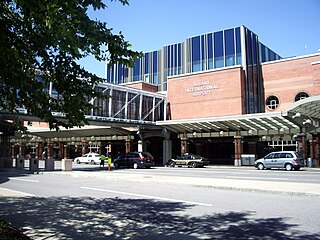Related Research Articles

An airline is a company that provides air transport services for traveling passengers or freight (cargo). Airlines use aircraft to supply these services and may form partnerships or alliances with other airlines for codeshare agreements, in which they both offer and operate the same flight. Generally, airline companies are recognized with an air operating certificate or license issued by a governmental aviation body. Airlines may be scheduled or charter operators.

The Airline Deregulation Act is a 1978 United States federal law that deregulated the airline industry in the United States, removing federal control over such areas as fares, routes, and market entry of new airlines. The act gradually phased out and disbanded the Civil Aeronautics Board (CAB), but the regulatory powers of the Federal Aviation Administration (FAA) over all aspects of aviation safety were not diminished.

Albany International Airport is six miles (9.7 km) northwest of Albany, in Albany County, New York, United States. It is owned by the Albany County Airport Authority. ALB covers 1,000 acres (400 ha) of land.

Westchester County Airport is a county-owned airport in Westchester County, New York, United States, three miles (6 km) northeast of downtown White Plains, with territory in the towns of North Castle and Harrison, New York, and the village of Rye Brook, New York. It is sometimes referred to as the White Plains Airport and is so identified by the Official Airline Guide (OAG).

Buffalo Niagara International Airport is in Cheektowaga, New York, United States. The airport serves Buffalo, New York and Niagara Falls, New York in the United States, and the southern Golden Horseshoe region of Ontario, Canada. It is the third-busiest airport in the state of New York and the busiest inside of the Buffalo-Niagara Falls metropolitan area. It is about 11 miles (18 km) east of Downtown Buffalo and 60 miles (97 km) southeast of Toronto. The airport covers 1,000 acres (400 ha).

A regional airline is a general classification of airline which typically operates scheduled passenger air service, using regional aircraft, between communities lacking sufficient demand or infrastructure to attract mainline flights. In North America, most regional airlines are classified as "fee-for-departure" carriers, operating their revenue flights as codeshare services contracted by one or more major airline partners. A number of regional airlines, particularly during the 1960s and 1970s, were classified as commuter airlines in the Official Airline Guide (OAG).

Checked baggage is luggage delivered to an airline or train for transportation in the hold of an aircraft, storage on a coach bus or baggage car of a passenger train. Checked baggage is inaccessible to the passenger during the flight or ride, as opposed to carry-on baggage.
Airline deregulation is the process of removing government-imposed entry and price restrictions on airlines affecting, in particular, the carriers permitted to serve specific routes. In the United States, the term usually applies to the Airline Deregulation Act of 1978. A new form of regulation has been developed to some extent to deal with problems such as the allocation of the limited number of slots available at airports.
The Montreal Convention is a multilateral treaty adopted by a diplomatic meeting of ICAO member states in 1999. It amended important provisions of the Warsaw Convention's regime concerning compensation for the victims of air disasters. The Convention attempts to re-establish uniformity and predictability of rules relating to the international carriage of passengers, baggage and cargo. Whilst maintaining the core provisions which have served the international air transport community for several decades, the treaty achieves modernization in a number of key areas. It protects passengers by introducing a two-tier liability system that eliminates the previous requirement of proving willful neglect by the air carrier to obtain more than US$75,000 in damages, which should eliminate or reduce protracted litigation.

The Civil Aeronautics Board (CAB) was an agency of the federal government of the United States, formed in 1940 from a split of the Civil Aeronautics Authority and abolished in 1985, that regulated aviation services and, until the establishment of the National Transportation Safety Board in 1967, conducted air accident investigations. The agency was headquartered in Washington, D.C.

An airline hub or hub airport is an airport used by one or more airlines to concentrate passenger traffic and flight operations. Hubs serve as transfer points to help get passengers to their final destination. It is part of the hub-and-spoke system. An airline may operate flights from several non-hub (spoke) cities to the hub airport, and passengers traveling between spoke cities connect through the hub. This paradigm creates economies of scale that allow an airline to serve city-pairs that could otherwise not be economically served on a non-stop basis. This system contrasts with the point-to-point model, in which there are no hubs and nonstop flights are instead offered between spoke cities. Hub airports also serve origin and destination (O&D) traffic.

Juneau International Airport is a city-owned, public-use airport and seaplane base located seven nautical miles northwest of the central business district of Juneau, a city and borough in the U.S. state of Alaska which has no direct road access. The airport is a regional hub for all air travel, from bush carriers to major U.S. air carriers such as Alaska Airlines.

Central Wisconsin Airport, referred to as "C-Way", is a public airport located 3 nautical miles southeast of the central business district of Mosinee, in Marathon County, Wisconsin, United States. It is owned by Marathon County and Portage County. It is included in the Federal Aviation Administration (FAA) National Plan of Integrated Airport Systems for 2025–2029, in which it is categorized as a non-hub primary commercial service facility. It is the fifth busiest of eight commercial airports in Wisconsin in terms of passengers served.
Aviation law is the branch of law that concerns flight, air travel, and associated legal and business concerns. Some of its area of concern overlaps that of admiralty law and, in many cases, aviation law is considered a matter of international law due to the nature of air travel. However, the business aspects of airlines and their regulation also fall under aviation law. In the international realm, the International Civil Aviation Organization (ICAO) provides general rules and mediates international concerns to an extent regarding aviation law. The ICAO is a specialized agency of the United Nations.
Airlines for America (A4A), formerly known as Air Transport Association of America (ATA), is an American trade association and lobbying group based in Washington, D.C. that represents major North American airlines since 1936.

The Air Passengers Rights Regulation 2004 is a regulation in EU law establishing common rules on compensation and assistance to passengers in the event of denied boarding, flight cancellations, or long delays of flights. It requires compensation of €250 to €600 depending on the flight distance for delays over of at least three hours, cancellations, or being denied boarding from overbooking. Delays shorter than three hours means no entitlement to any compensation of any kind even if the delay was classified as non-extraordinary. Airlines must provide refreshments and accommodation where appropriate. The Court of Justice of the European Union has interpreted passenger rights strictly, so that there are virtually no exceptions for airlines to evade their obligations for breach of contract.
The United States has an extensive air transportation network. In 2013, there were 86 airports in the U.S. that annually handled over 1,000,000 passengers each. The civil airline industry is entirely privately owned and has been largely deregulated since 1978, while most major airports are publicly owned. The three largest airlines in the world by passengers carried are U.S.-based; American Airlines is number one after its 2013 acquisition by US Airways. Of the world's 50 busiest passenger airports, 16 are in the United States, including the top five and the busiest, Hartsfield–Jackson Atlanta International Airport. In terms of cargo, in 2015, eight of the world's thirty busiest airports were in the U.S., including the world's second-busiest, Memphis International Airport, just behind Hong Kong International Airport in Hong Kong. Private aircraft are also used for medical emergencies, government agencies, large businesses, and individuals.

A flight delay occurs when an airline flight takes off and/or lands later than its scheduled time. The United States Federal Aviation Administration (FAA) considers a flight to be delayed when it is 15 minutes later than its scheduled time. A flight cancellation occurs when the airline does not operate the flight at all for a certain reason.

The New York metropolitan area has the busiest airport system in the United States and the second-busiest in the world after London. It is the country's most frequently used port of entry and departure for international flights.

Intrastate airlines in the United States were air carriers operating solely within a single US state and taking other steps to minimize participation in interstate commerce, thus enabling them to escape tight federal economic airline regulation prior to US airline deregulation in 1979. These intrastate carriers therefore amounted to a small unregulated, or less regulated, sector within what was otherwise then a tightly regulated industry. As detailed below, flying within the geographic boundaries of a single state was a necessary but not sufficient condition to qualify as an intrastate carrier.
References
- ↑ Frequently Asked Questions, Air Traffic Control System Command Center, Federal Aviation Administration. The term "Rule 240" refers to a rule that existed before airline deregulation. There is no longer an actual Rule 240.